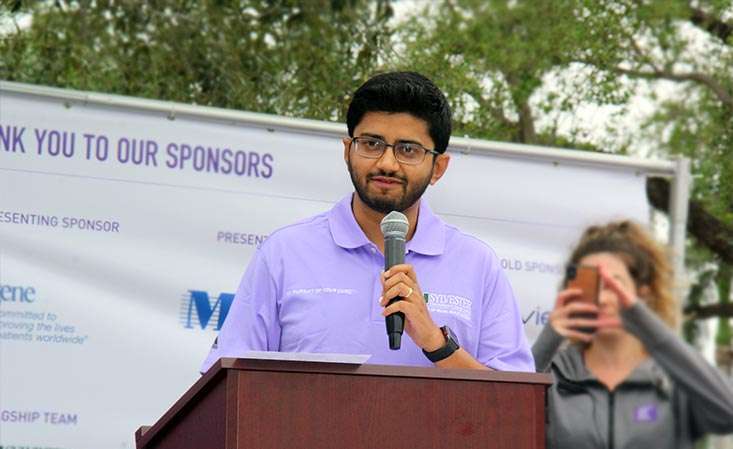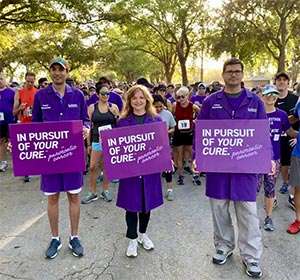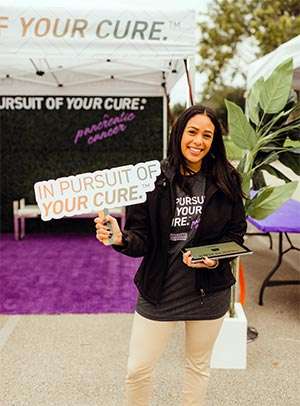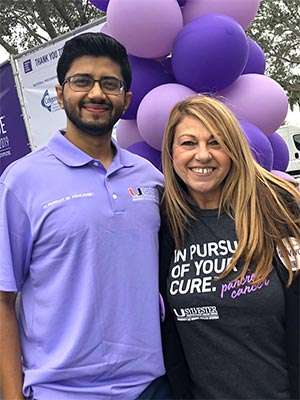
Dr. Jashodeep Datta, Assistant Professor of Surgery at University of Miami School of Medicine, Sylvester Comprehensive Cancer Center, speaks at PurpleStride Broward-Palm Beach last year
Editor’s note: Sylvester Comprehensive Cancer Center, part of the University of Miami Health System, has been a PanCAN PurpleStride sponsor and avid PanCAN supporter in South Florida for six years. This year, Sylvester Comprehensive Cancer Center is fielding a Flagship Team for Broward-Palm Beach and is Presenting Sponsor for PurpleStride Miami Beach. Today, guest blogger Dr. Jashodeep Datta, Assistant Professor of Surgery at University of Miami School of Medicine, Sylvester Comprehensive Cancer Center describes the diagnosis and successful treatment of a patient during the pandemic and why Sylvester Comprehensive Cancer Center’s commitment is stronger than ever.
As the world was besieged with the COVID-19 pandemic, medical communities all across the globe pivoted towards urgent care for individuals afflicted with this terrible disease. One of the notable exceptions to this dramatic volte-face in healthcare prioritization was the continued meticulous and comprehensive care required for cancer patients. And given the complexities in the multidisciplinary management of pancreatic cancer, navigating these patients through the different facets of their care – while balancing the risks posed to them by COVID-19 – became an unprecedented challenge.
From the perspective of physicians taking care of pancreatic cancer patients, not only were we still dealing with patients’ complex underlying diseases, but we were also grappling with their heightened vulnerability to viral infection, since chemotherapy and surgery both suppress the immune system.

Sylvester Comprehensive Cancer Center staff shows their passion at PurpleStride Broward-Palm Beach.
Furthermore, more so than probably any other cancer, pancreatic cancer patients require repeated trips to healthcare facilities, from biweekly chemotherapy infusions, to managing endoscopic stents to prevent biliary infection from their biliary obstruction, to relatively longer perioperative stays in the hospital to recover from major pancreatic surgery.
Another important component in the fight against pancreatic cancer took a major hit. Researchers all across the world were separated from their laboratories, impressive research momentum stunted, and translational and clinical discoveries via clinical trials stalled. Together, this constellation of factors made pancreatic cancer care during the COVID-19 pandemic a unique inflection point in our progress towards eradicating this disease.
And despite these obstacles, pancreatic cancer patients, their physicians, and pancreatic cancer researchers alike rose to the challenge.
One particular patient I took care of at the Sylvester Comprehensive Cancer Center at the University of Miami during the pandemic elegantly highlights the complex coordination that was required to guide our patients through these difficult times. An 82-year old Cuban-American grandmother came to me with a pancreatic head adenocarcinoma that had slowly grown into her duodenum and bile duct. It had kept her from eating for several weeks and she was malnourished, jaundiced, debilitated, and hopeless. She had been turned away as untreatable and inoperable at local cancer centers and community hospitals.

Sylvester Comprehensive Cancer Center in show of support for pancreatic cancer patients at PanCAN’s PurpleStride Broward-Palm Beach.
At Sylvester, we pursued our own investigations, which revealed an extremely rare microsatellite unstable (i.e., MSI-high) pancreatic cancer. These tumors represent only 1% of all pancreatic cancers but are exquisitely susceptible to checkpoint immunotherapy. And while her tumor was technically resectable, she would need a Whipple procedure, which at her extremely debilitated and malnourished condition was going to be fraught with a high risk of perioperative complications and even death. However, sensing a tremendous opportunity to capitalize on her unique and immunotherapy-responsive tumor biology, I initially performed a laparoscopic procedure to bypass her intestinal blockage and give her an opportunity to eat, gain weight, and improve her nutrition and conditioning.
Notwithstanding, at this point, I gave her a 5% chance of being able to make it to Whipple surgery. But I gave the patient and her family a challenge—improve her nutritional and physical parameters so that she could make it to and through a complex and risky operation.
As she was getting stronger, we administered immunotherapy prior to surgical resection—so-called neoadjuvant treatment. However, as said earlier, care coordination was extremely labor-intensive and challenging due to the COVID-19 pandemic. She required multiple trips to interventional radiology, developed intolerance to immunotherapy, suffered infections, and had multiple readmissions.
Ultimately, she was enrolled in a cancer pre-habilitation program to prepare her for surgery. She endured all these trials and tribulations, and her and her family’s energy and dedication to defeat this disease was unlike anything I had ever seen before.
I successfully completed a very complex Whipple procedure. Our efforts at pre-rehabilitation paid off handsomely, and she recovered without any major complications. Remarkably, she ended up having a complete pathologic response to the immunotherapy— meaning, no residual cancer cells remaining in the resected specimen—and her surgical resection margins were negative for any malignancy. A patient who just months earlier could neither eat nor walk was essentially cured of her disease, and she never contracted COVID-19 during her multiple trips to the hospital.
Recently, she returned to my clinic for a follow-up visit and treated my entire staff to a delicious home-cooked Cuban meal.

Dr. Jashodeep Datta, Assistant Professor of Surgery at University of Miami School of Medicine, Sylvester Comprehensive Cancer Center, stands with pancreatic cancer survivor Camille Moses at PanCAN’s PurpleStride Broward-Palm Beach
We have now taken her unique tumor to our laboratory and are trying to understand the molecular and immunologic underpinnings of exactly why her tumor responded so well to immunotherapy. We believe that these efforts will inform the care– and possible cure—of many patients with pancreatic cancer in the near future. At the confluence of COVID-19, pancreatic cancer, and scientific innovation, hers is a perfect example of the fact that even though one might not be able to change the direction of the wind, one must be willing to adjust the sails to reach the desired destination.
I believe, like the metaphorical phoenix rising from the ashes of the COVID-19 pandemic, pancreatic cancer research and clinical care will be stronger than ever before.
Our commitment to this disease is stronger than ever before. Our patients’ resolve to overcome the helplessness of their condition is more steadfast than ever before. Our pancreatic cancer advocates are more resolute in their dedication to this cause than ever before. Our researchers are reinvigorated with a passion to understand the biological basis of this devastating illness and make therapeutic discoveries at the bench more rapidly available to patients than ever before. Our governing bodies and funding institutions have ramped up their support for pancreatic cancer research and clinical care.
And finally, organizations like the Pancreatic Cancer Action Network serve as a beacon of hope and promise to everyone impacted by this disease. Their tireless advocacy and relentless pursuit of a cure ensure that the multidisciplinary efforts will be seamlessly coalesced into a unified fight against pancreatic cancer.
I have always found PanCAN’s PurpleStride memorable because of the incredible spirit and sense of mission in the participants. It really hits home that there is a massive community who depend on our efforts at eradicating this disease. With this year’s virtual PurpleStride, I’m looking forward to being inspired by more patients, caregivers and advocates as we strive to make pancreatic cancer history.














